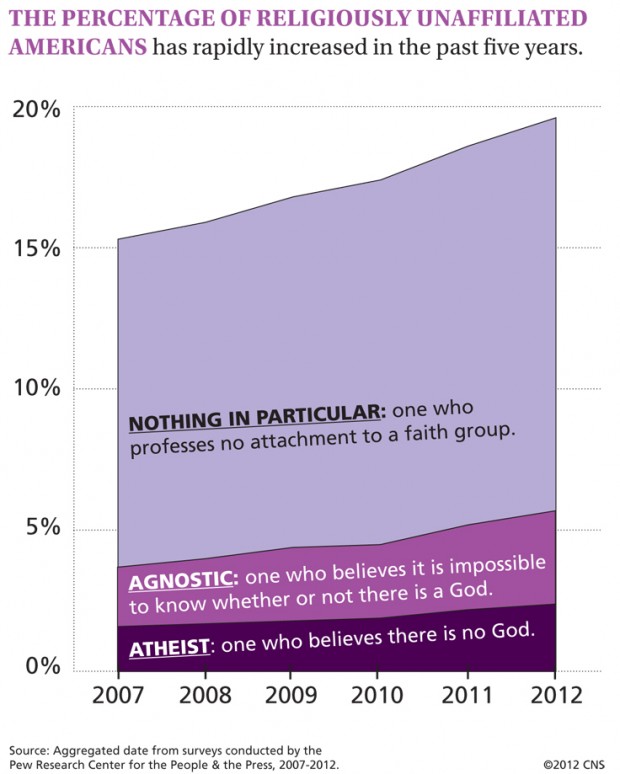WASHINGTON (CNS) — People who say they are unaffiliated with any religion constitute nearly 20 percent of the American public, making them almost as numerous as Catholics, who accounted for 22 percent of participants in a new Pew Research Center study released Oct. 9.
The survey of 2,973 adults conducted this summer found people who say they are atheist, agnostic or “nothing in particular” grew by almost 5 percentage points since 2007, from 15.3 percent to 19.6 percent of the population.
The greatest shift toward “nothing in particular” apparently came from Protestants, who now make up 48 percent of the population, compared to 53 percent in 2007, the telephone study found.
[hotblock]
“These are not necessarily nonbelievers,” said Greg Smith, senior researcher for the Pew Forum on Religion & Public Life, at an Oct. 9 discussion on the study hosted by “Religion & Ethics Newsweekly,” a PBS TV show. “They’re just not associated with any faith in particular.”
The religiously unaffiliated tend to be younger than the general public, the survey showed, with 35 percent between ages 18 and 29, and 37 percent ages 30-49. Of the general public, about 22 percent are between 18 and 29, and 35 percent between 30 and 49.
Kim Lawton, managing editor for “Religion & Ethics Newsweekly,” said although the study shows that the vast majority of Americans still are affiliated with a faith, the report stands out for the rapid growth it shows in the unaffiliated segment. The program planned a three-week series on the study starting Oct. 12.
The study found declines since 2007 of 1 percent among those who say they are Catholic, 3 percent among white mainline churches, 2 percent among white evangelical churches and no change among black Protestants, Mormons or Orthodox. Those who said they identify with “another faith” grew over the five-year period, from 4 percent to 6 percent of the survey.
Only 2.4 percent of the unaffiliated category described themselves as atheist, and just 3.3 percent said they are agnostic. The majority in the category — 13.9 percent of the total survey — described themselves as nothing in particular.
Smith said the majority of those in the unaffiliated category say they believe in God and think of themselves as religious or spiritual. They are less likely to pray than the general public (58 percent pray daily and 21 percent do so weekly/monthly), but 42 percent of the unaffiliated category said they pray somewhat regularly (21 percent daily and 20 percent weekly/monthly).
Nor are the unaffiliated necessarily hostile toward religious institutions, Smith noted. But they’re not searching for a religious home, either, he added. He said the growth in the number may in part be attributed to a societal change that has reduced the potential stigma of not belonging to any faith institution.
The survey report said that over the four-year study period, the self-reported level of attendance at religious services has changed relatively modestly, from 38 percent in 2007 to 37 percent in 2012 who say they attend services weekly. Twenty-seven percent in 2007 said they seldom or never attend services and 29 percent said so this year.
The study asked both the unaffiliated and those who said belong to a particular faith why they don’t attend religious services more often. Among unaffiliated people, the most frequent answers related to disagreements with the church, such as: “don’t agree with religion,” “it’s not necessary to attend church,” or “my church isn’t strict enough.”
People who are affiliated with a religion were most likely to list personal priorities and practical difficulties, such as “too busy” or “work conflicts” as their main reasons for not going more often.
Other panelists at the “Religion & Ethics” event focused on the political dynamics related to the growth of the “unaffiliated” segment of society. Sixty-three percent of religiously unaffiliated registered voters identified themselves as Democrats or said they lean toward Democrats. Twenty-six percent said they are Republican or lean Republican.
Mike McCurry, former press secretary to President Bill Clinton, is now a political consultant and a graduate student in theology at Wesley Theological Seminary. He said the survey suggests the growth of the unaffiliated segment “is a message less to political parties than it is to churches.”
Demographically by most measures and on some issues raised by researchers, the unaffiliated segment reflects views similar to the country as a whole. But on a handful of issues they stood apart. For instance they generally reflect national educational attainment and income levels and hold views similar to the general public on smaller or bigger government.
But when it comes to opinions on whether same-sex marriage or abortion should be legal, the unaffiliated voters were much more likely to say yes to both questions. Nearly three-quarters of the unaffiliated people said yes to both questions, compared to slightly more than half of the general public on each.
The unaffiliated also were significantly more likely than the general public to say churches should keep out of political matters and should not endorse political candidates, agreeing with those positions by about 10 percent more than the general public.
For the total sample size, the margin of error is plus or minus 2.1 percentage points. For smaller segments of the survey, it is as high as plus or minus 6.3 percentage points.
PREVIOUS: Georgia’s Catholic archdiocese, diocese file suit against HHS mandate
NEXT: Defending life, liberty part of the new evangelization, archbishop says



Share this story